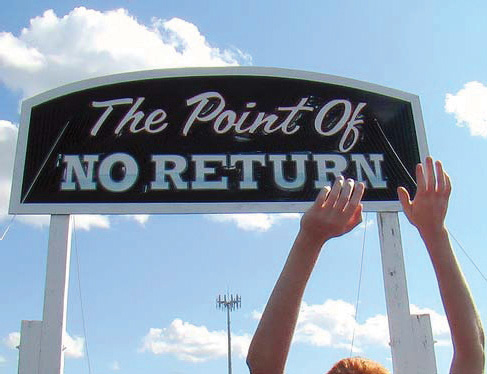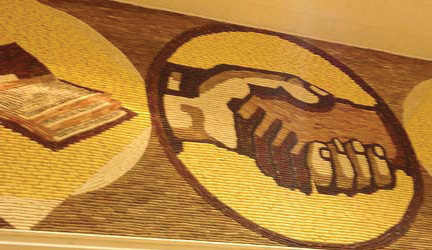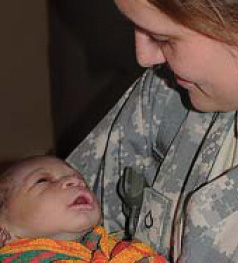
Source: Photo courtesy of Patrick Hawks, http://www.flickr.com/photos/pathawks/796254651/.
Tamica Tanksley graduated from Temple University in Philadelphia in 2000. About a decade later she worked her way into an important role in the office of Pennsylvania State Senator Vincent Hughes: she’s codirector of his community affairs outreach and efforts. Though not a celebrity or mightily important in politics, what she’s done with her life up to now earned her a brief write-up and a chance to answer a few interview questions in Temple’s Internet Alumni magazine.“Tamica Tanksley, SCT ’00,” Temple University, accessed May 12, 2011, http://www.myowlspace.com/s/705/index.aspx?sid=705&gid=1&pgid=1021&cid=1612&ecid= 1612&ciid=3725&crid=0.
She describes her job responsibilities as linking the senator with “community leaders, educators, religious organizations, constituents and various institutions within the public and private sector.” It all comes naturally to her. As she puts it, “I didn’t choose politics, politics chose me. And if I had to do it all over again, I wouldn’t change a thing.…Working in the government sector where my daily responsibilities afford me the opportunity to empower and inspire everyday people is a career that ignites my passion for people.”
It’s not just heavy, public service trudging, though; Tanksley also finds the job “fun” because it allows her “creative juices to flow into a sea of possibilities,” and in a different part of the interview she calls the work, in a sense, victorious: “As a citizen and voter, I’ve learned that this game of life is not won by standing on the sidelines. In order to provoke change and improve the quality of life for everyone, we must get into the game because victories are won on the field.”
How’d she get the job? The way a lot of people start off in politics, by serving in that same office as a volunteer worker.
Finally, since it’s a Temple University website, the interviewer tries to get in a plug for the school and succeeds with this memory Tanksley produces of Dr. Jean Brody’s public relations course and the prof’s infamous (at least on the Temple campus) red pen: “While I was often saddened by my white paper being flooded by red pen marks, I quickly learned that Dr. Brody and her red pen refined the best in me. With each passing assignment, the red marks lessened and my knowledge and experience increased. Moreover, it was the red that encouraged me to do my best work, which has ultimately contributed to the dedicated worker I am today.”
Tanksley reports about her young life up to this point that “if I had to do it all over again, I wouldn’t change a thing.” Can you use this as a point of departure for
For virtue ethics, knowing what to do with your life—responding to its problems, choosing goals to reach for—isn’t something you can just figure out no matter how intelligent you may be or how many ethics classes you’ve taken. To succeed, you also need a good society, one that does two things:
How could Dr. Jean Brody be considered a teacher of virtue? What particular virtues did she teach Tanksley, and how did she provide a way to practice using them?

Source: Photo courtesy of Myki Roventine, http://www.flickr.com/photos/myklroventine/847530903/.
In Mexico City, police salaries are extremely low. They live decently enough, though, by adding bribes (mordidas in Spanish) to their wages. During a typical week they pull in bribe money that more or less equals their monthly salary. All the locals know how it works, especially when it comes to the most avid collectors, the traffic cops. In the standard procedure, the officer pulls a car over, takes out his codebook, walks up, and hands it to the driver. Ostensibly, he’s allowing confirmation that the law actually prohibits whatever was done. This is what actually happens: the driver slips about fifty pesos (a little under five dollars) into the book, closes it, hands it back, and is free to go.Business Ethics Workshop video, accessed May 12, 2011, http://businessethicsworkshop.com/Chapter_4/Mordida%20in%20the% 20booklet.html. The practice is so routine that frequently the procedure is abbreviated and participants don’t even bother trying to hide the payoff or going through the codebook pantomime. They may approach the officer’s patrol car and directly drop the money onto the guy’s lap.Business Ethics Workshop video, accessed May 12, 2011, http://businessethicsworkshop.com/Chapter_4/How_to_purchase_a_police_ officer.html. Or they may stay in their own car and just hand cash out to be directly pocketed.Business Ethics Workshop video, accessed May 12, 2011, http://businessethicsworkshop.com/Chapter_4/Quick_mordida.html. Regardless, the transaction is smooth and efficient.
Despite the bribery’s efficiency and its penetration to society’s core, not everyone in Mexico City is happy with the constant mordidas. According to a story in the city’s largest circulation daily, a mayor in one of the suburbs decided to take a lonely stand against the informal police action. Since all the police are in on it, he couldn’t resort to an Untouchables-styled internal affairs operation. And since all the citizens considered the payoffs perfectly normal, he couldn’t appeal to them for help either. Really, he was left with only one choice. To interrupt the habit, he made traffic tickets illegal. His suburb became a free driving zone where anybody could do whatever they wanted in their car and the police couldn’t respond. A lot happened after that, but there’s no doubt that the payoffs stopped.Alejandro Almazán, “Fin de la mordida,” El Universal, November 16, 2003, accessed May 12, 2011, http://www2.eluniversal.com.mx/pls/impreso/noticia.html?id_nota= 54910&tabla=ciudad.
About the bribery in Mexico City, not only is it the way things have been done as long as anyone can remember, but the process actually makes a lot of sense; it’s even very economically efficient because the middlemen are being cut out. Instead of having to pay an administrative staff to process traffic tickets, then accept deposits into the city’s account, and then redistribute the money back out as part of police salaries, here the money goes straight into the officer’s pocket.
Think of yourself as a virtue ethicist.
The video Mordida in the Booklet (http://businessethicsworkshop.com/Chapter_4/C4.html) shows a motorcycle officer getting paid off. One curious aspect is how long and intense the discussion stretches between the officer and the pulled-over driver. What they’re doing is negotiating the amount. The fifty peso price tag is a good average, but the number can drop or climb depending on the give and take.Business Ethics Workshop video, accessed May 12, 2011, http://businessethicsworkshop.com/Chapter_4/Mordida%20in%20the% 20booklet.html.
In the newspaper article about the Mexico City suburb where the Mayor decided to ban traffic tickets, the reporter interviewed a police officer described as “an old transit cop whose juicy bribes had helped buy his gold necklaces and bracelets.” This was the old cop’s reaction to the situation (translated from Spanish): “I got my buddies together and I told them, ‘This sucks, now what’re we going to do for money?’”
An ethics of care shifts the focus of moral thought away from the fair imposition of rules and toward the maintenance of immediate personal relationships. Ethics isn’t about treating everyone equally so much as it is about keeping companions together.

Source: Photo courtesy of Richard Riley, http://www.flickr.com/photos/rileyroxx/2969244149/.
In his blog thezspot, author Z raises two questions about people receiving unemployment paychecks. Both are laced with suspicion of fraud. First, people who are collecting unemployment checks are required to show they’re at least trying to get a job, but Z writes that some are “showing up for interviews in jeans and t-shirts.” Then he asks, “Do these people really want the job, or are they just showing up to say that they are actively seeking work?”Business Ethics Workshop, accessed May 12, 2011, http://businessethicsworkshop.com/Chapter_4/Unemployment_fraud.html.
He goes from there to a second critical point. “Some people,” Z says, “are collecting unemployment checks even though they’re actually working.” What they do is turn in their unemployment form listing the days they worked, and those are deducted from the check they receive. That sounds OK in the abstract, but, he adds, “The problem is that these people who are ‘on call’ are not taking shifts that are offered to them. Those shifts don’t get deducted from their unemployment. So, while there are people who are actually unemployed, struggling and looking to find work, there are Union employees sitting at home deciding when they do and don’t want to come in. And collecting unemployment.”
From the posting’s response section, here are two contributions:
The second cited response to Z is a question about how an unemployment cheat can be reported “without them knowing.”

Source: Photo courtesy of US Army Africa, http://www.flickr.com/photos/usarmyafrica/4034104565/.
The post of cook in the mess hall is probably one of the Army’s least dangerous assignments, the closest you get to actual battle is a food fight, but it’s still a military job where you go and do what your orders command. For Specialist Alexis Hutchinson, a twenty-one-year-old Army cook, that meant catching a flight to Afghanistan. She missed hers, though, intentionally. She regretted abandoning her unit, but felt she had no choice. The single mother of a ten-month-old, she says she couldn’t find anyone to care for her child during the absence; the only potential help, her mother, was already overwhelmed by caring for three other relatives with health problems. Hutchinson’s fear, according to her lawyer, was that if she showed up at the airport, the Army “would send her to Afghanistan and put her son with child protective services.”
For its part, a military spokesman says, “the Army would not deploy a single parent who had nobody to care for a child.”
The situation is under review, but for the present, just like anyone else who refuses deployment, she’s under military arrest on her base in Georgia.“Mother Refuses Deployment,” New York Times, November 16, 2009, accessed May 12, 2011, http://www.nytimes.com/2009/11/17/us/17soldier.html.
Virtue ethics
Ethics of care